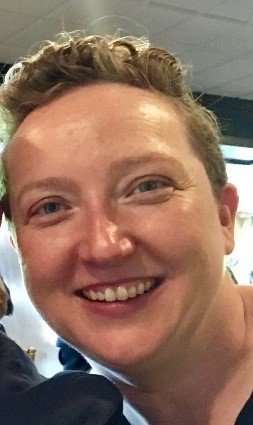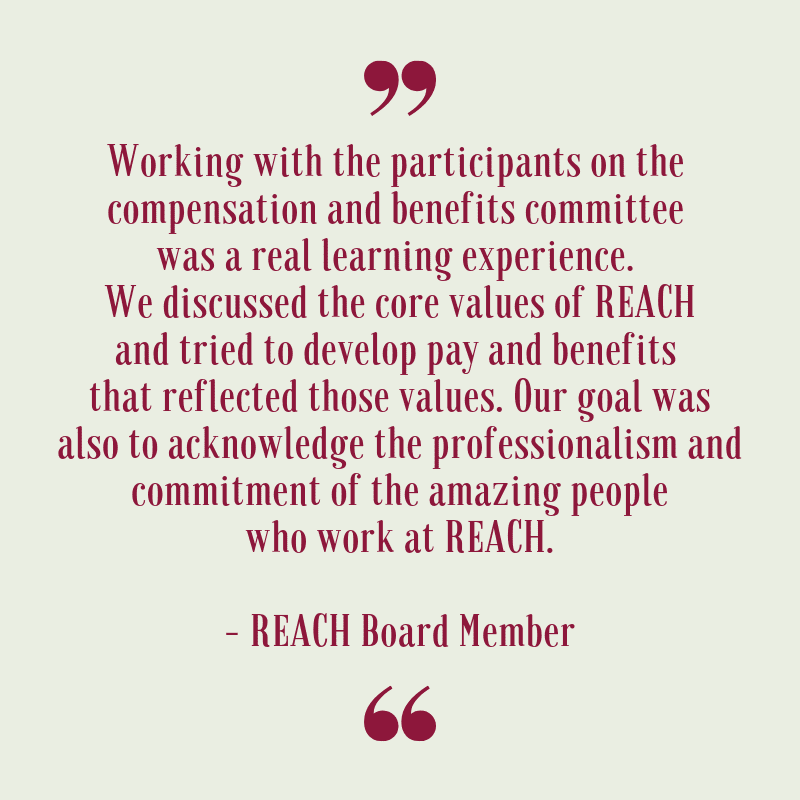
This is Part Three of a three-part series written by REACH’s Associate Executive Director Deborah Heimel. Deb has worked at REACH for 14 years and manages the internal operations of the organization including human resource management responsibilities such as hiring and onboarding new staff members, administering paid time off benefits and medical insurance benefits, and managing payroll. In spring of 2019, Deb led a process with board and staff members to discuss and propose changes to our compensation and paid time off benefits. This is how we got there and how it went.
The Overview of this series is in Part One and the summary on Compensation in Part Two. We wrap up this series in Part Three about paid time off benefits.
This past spring, we created an ad hoc Human Resources Committee to review and make recommendations about REACH’s compensation and paid time off benefits for staff. We used our organizational values to guide this work and created a process that allowed for transparency and honesty.

I have worked at REACH for 14 years and when people ask why I stay so long, I answer them honestly – I love the people I work with. I love them as individual people and I love the passion, integrity and sense of humor they bring to their work. For the committee conversations around benefits, the language we used often came back to the value “We take care of ourselves and one another.” And one way to acknowledge someone’s wonderful work is to give them time away from it.
We focused our committee conversations on the paid time off benefits of sick time, vacation time, holidays and bereavement leave. We focused on areas to change based on some overarching questions:
- What does it look like to offer benefits that are sustainable to REACH and to the employee?
- What does racial equity and social justice look like in paid time off benefits?
For fulltime employees, REACH provides four weeks of paid vacation time upon hire that increases to five weeks after three years of employment. REACH also provides ten paid holidays. We discussed changing both of these and ultimately did not, instead making changes in other areas.
REACH previously offered ten paid sick days per year to fulltime employees. We support a culture where it is okay to take time off for wellness – physical or emotional. Because you have heard trauma story after trauma story and it is only Tuesday and you need to just sit on a beach, look at the ocean, and breathe. Take the time for yourself or for others in your life. Take care of the people and animals you love. We care about our colleagues as more than employees – we care about each other as people. We want our colleagues to be sustainable not just in their work at REACH but in their entire lives. And to do that we need to address the toll of being exposed to the suffering of others. To this end we increased from ten sick days/year to twelve days and added language about emotional wellbeing to the employee handbook.

Just as we support using sick days to care for others in your life without defining or judging a relationship, we changed our bereavement leave policy to reflect this as well. There is no hierarchy of relationships, no expectation that you are closer to your sister than your cousin. We modified our bereavement leave policy so that there is no stipulation as to who may grieve for and who you may not. Additionally, we understand that grief takes many forms so we added language allowing for extended time as needed.
And finally, we wanted to reward longevity. We need to mitigate burnout. We need to support people in pursuing their hobbies and personal relationships. Some staff felt that they would have a hard time taking more vacation time if we were to add a new longevity vacation time bonus. But what about an occasional extended break to recharge and rejuvenate? Sabbaticals are now offered in many corporate settings. Why not in human services as well? So we added a four week paid sabbatical for fulltime employees after every seven years of employment. Something where it is not required to do anything that is educational or professionally tied to your job. Focusing on recharging and rejuvenating is actually EVERYTHING and is the primary skill that you could bring back to enhance your work.

While I breathed a sigh of relief that this process was over, I recognize that it is a beginning as well as an end. We still have a lot of work to do. It all comes back to showing up each and every day in a way that allows us to do our best possible work. We want our work with survivors, community members, volunteers, and donors to be relational and adaptable to individual needs, and we are better able to do so when we work in that kind of environment.
How we do our work matters. Part of my work is creating a culture that justly cares for every staff member. If you want to get more involved or you want more information on anything you have read, please contact me at deb@reachma.org or our Executive Director Laura Van Zandt at laura@reachma.org. We are all in this together.





